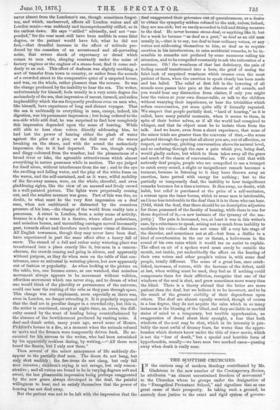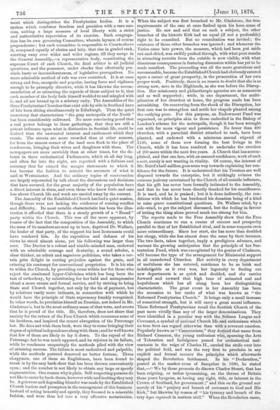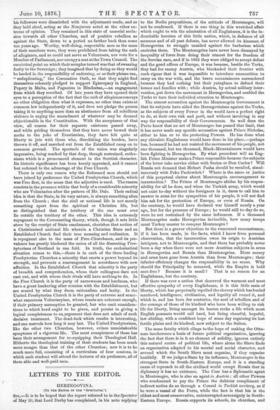THE SCOTTISH CHURCHES.
IN the curious map of modern theology contributed by Mr. Gladstone to the new number of the Contemporary Review, he attributes "an almost unrestrained freedom of movement" to the Churches whom he groups under the designation of the "Evangelical Protestant School," and signalises that as one great cause of their prosperity. In taking such a ground, he scarcely does justice to the exact and rigid system of govern- meat which distinguishes the Presbyterian bodies. It is a system which combines freedom and precision with a rare suc- cess, uniting a large measure of local liberty with a strict and authoritative supervision of its exercise. Each congrega- tion has its own governing Committee, wherein laymen of course preponderate ; but each -committee is responsible to Courts above it, composed equally of clerics and laity, that rise in graded rank, exerting sway over wider and wider regions, till they merge in the General Assembly,—a representative body, constituting the supreme Court of each Church, the final arbiter in all judicial questions, and the possessor, under checks that effectually pre- clude haste or inconsiderateness, of legislative prerogatives. No more admirable method of rule was ever contrived. It is at once strong and free, energetic and popular, having force and vigilance enough to be promptly directive, while it has likewise the recom- mendation of so attracting the regards of those subject to it, that each member of the body feels himself wedded to and mingled with it, and all are bound up in a salutary unity. The Assemblies of the three Presbyterian Churches that exist side by side in Scotland have of late been sitting simultaneously in Edinburgh. Thus the quiet monotony that characterises "the gray metropolis of the North" has been considerably enlivened. No more convincing proof that a real power belongs to these gatherings, that they are still a potent influence upon what is distinctive in Scottish life, could be desired than the unwonted interest and excitement which they create. The streets are more crowded than at other seasons, for from the utmost corner of the land men flock to the place of rendezvous, bringing their wives and daughters with them. The newspapers are more unwieldy than at other times, for the de- bates in these ecclesiastical Parliaments, which sit all day long, and often far into the night, are reported with a fullness and accuracy that far exceed the meagre statements to which it has become the fashion to resttict the accounts of 'what is said at Westminster. And the ordinary topics of conversation are largely superseded by talk about the discussions and decisions that have occured, for the great majority of the population have a direct interest in them, and even those who know little and care less about Church life and work are carried away by the current.
The Assembly of the Established Church has had a quiet session, though there were not lacking the evidences of coming conflict and difficulty. Its most notable characteristic has been the illus- tration it afforded that there is a steady growth of a " Broad " party within the Church. This was all the more apparent, by reason of the fact that the composition of the Assembly, to which the mass of its members are sent up in turn, deprived Dr. Wallace, the leader of that party, of the support his beat lieutenants could have rendered him. In the exposition and defence of his views he stood almost alone, yet his following was larger than ever. The Doctor is a robust and nimble-minded man, endowed with an admirable courage and dexterity, a sound scholar, a clear thinker, an adroit and sagacious politician, who takes a cer- tain grim delight in cutting prejudice against the grain, and evincing his contempt for conventional proprieties. It is his aim to widen the Church, by providing room within her for those who reject the straitened hyper-Calvinism which has long been the test of orthodoxy, by substituting for her bald and unimpressive ritual a more ornate and formal service, and by striving to bring State and Church together, not only by the tie of payment, but by relations vastly more intimate, in connection with which he would have the principle of State supremacy frankly recognised. In other words, he proclaims himself an Erastian, not indeed in Mr. GLa.dstonea, but in the most ordinary sense of that term, and avows that he is proud of the title. He, therefore, does not share that anxiety for the return of the Free Church which consumes some of his brethren, and inspired the recent abrogation of the Patronage law. He does not wish them back, were they to come bringing their dogma of spiritual independence along with them; and he well knows that few of them are likely to lay it down. To the repeal of the Patronage Act he was much opposed, and he rejoices in its failure, while he condemns unsparingly the methods plied with the view of attaining success. The failure is most undoubted and palpable, while the methods pursued deserved no better fortune. Three clergymen, one of them an Englishman, have been found to sneak in by the easy back-door that has been thrown conveniently open ; and the number is not likely to obtain any large or speedy augmentation. One reason why is plain. Self-respecting persons do not like to enter by back-doors, however wide and inviting they may be. A grievous and degrading blunder was made by the Established Church leaders and prompters in the management of this business. Instead of acting honestly and openly, they finessed in a miserable fashion, and were thus led into a very offensive sectarianism. When the subject was first broached to Mr. Gladstone, the true requirements of the case at once flashed upon his keen sense of justice. He saw and said that on such a subject, the other branches of the historic Kirk had an equal (if not a preferable) right to be consulted. But no consultation was invited ; the existence of those other branches was ignored ; and whenever the Tories came into power, the measure, which had been .put aside cut-and-dried, was swiftly pushed through, with what poor results in attracting recruits from the outside is now visible, with what disastrous consequences in fostering dissension within has yet to be made manifest. The proceeding was all the more gratuitous and unreasonable, because the Established Church had obviously entered upon a career of great prosperity, in the prosecution of her own proper work. Positively, there is no reason to doubt that she is as strong now, save in the Highlands, as she was before the Disrup- tion. Her missionary and philanthropic agencies are as numerous and as well supported ; while, in one department, the multi- plication of her churches at home, the progress made has been astonishing. On recovering from the shock of the Disruption, her first care was to strengthen and settle her chapels planted among the outlying poor. For this purpose, an Endowment Fund was organised, on principles akin to those embodied in the Bishop of London's scheme for the metropolis, though it has been wrought out with far more vigour and persistence. No fewer than 400 churches, with a parochial district attached to each, have been planted, and endowed with a minimum annual stipend of 1120, some of them now forming the best livings in the Church, while it has been resolved to undertake the erection of 200 more within the next five years. A Church that has accom- plished, and that can face, with an assured confidence, work of such a sort, surely is not wanting in vitality. Of course, the interest of Mr. Baird's half-million goes some way towards explaining her con- fidence for the future. It is understood that his Trustees are well disposed towards the enterprise, but it strikingly evinces the extreme jealousy entertained by the Church of all outside influence, that his gift has never been formally intimated to the .Assembly, and that he has never been directly thanked for his munificence. It is used, and he is praised ; but it is done indirectly, the con- ditions with which he has burdened his donation being of a kind to raise grave constitutional questions. Dr. Wallace tried, by a side-wind, to get the subject discussed, but the feeling in favour of letting the thing alone proved much too strong for him.
The reports made to the Free Assembly show that the Free Church continues to run a course of success and prosperity parallel to that of her Established rival, and in some respects even more extraordinary. Since her start, she has more than doubled her clergy, while she has almost done the same by their incomes.. The two facts, taken together, imply a prodigious advance, and warrant the growing anticipation that the principle of her Sus- tentation Fund, which was excogitated by the genius of Chalmers,. will become the type of the arrangement for Ministerial support in all unendowed Churches. Her activity in every department of usefulness she has entered, continues to be as brisk and indefatigable as it ever was, her ingenuity in finding out new departments is as quick and decided, and she carries forward and onward that high tone of animated zeal and hopefulness which has all along been her distinguishing characteristic. The great event in her Assembly has been the accession to her ranks of what was known as "the Reformed Presbyterian Church." It brings only a small increase of numerical strength, but it will carry a great moral influence. These Reformed Presbyterians recall the Scottish Church of the past more vividly than any of -the larger denominations. They were identified in a peculiar way with the Solemn League and Covenant, a symbol of national Church life and enthusiasm which no true Scot Can regard otherwise than with a reverent emotion. Popularly known as" Cameronians," they derived that name from. Richard Cameron, the young enthusiast who, spurning the Acts of Toleration and Indulgence passed for ecclesiastical mal- contents in the reign of Charles IL, carried the strife over into the political field, and was the very first to proclaim in any explicit and formal manner the principles which afterwards shaped the Revolution Settlement. In his "Declaration," posted at the market-cross of Sanquhar in 1680, he stated that,—" We by these presents do disown Charles Stuart, that has been reigning, or rather tyrannising, on the throne of Britain these years byegone, as having any right, title, or interest in the Crown of Scotland, for government ;" and this on the ground not merely of his "perjury and breach of covenant to God and His Kirk," but likewise by reason of "his tyranny and breach of the very leges regnandi in matters civil." When the Revolution came,
his followers were dissatisfied with the adjustment made, and so they held aloof, acting as the Nonjurors acted at the other ex- treme of opinion. They remained in this state of unsocial seclu- sion towards all other Churches, and of positive rebellion as against the State, down to a period no farther back than some ten years ago. Worthy, well-doing, respectable men as the mass of their members were, they were prohibited from taking the oath of allegiance, and so could not serve as Volunteers, nor vote for a Member of Parliament, nor occupy a seat at the Town Council. The casuistical point on which their scruples turned was that of swearing fealty to the Sovereign ; they imagined that by doing so they would be landed in the responsibility of endorsing, or as their phrase ran, "reduplicating," the Coronation Oath, so that they might find themselves solemnly pledged to support Episcopacy in England, Popery in Malta, and Paganism in Hindostan,—an engagement from which they revolted. Of late years they have opened their eyes to a perception of the fact that the oath of allegiance conveys no other obligation than what it expresses, no other than exists at common law independently of it, and does not pledge the person taking it to anything more than an abstinence from all rebellious violence in urging the amendment of whatever may be deemed objectionable in the Constitution. With the acceptance of that view, all reason for their separate existence passed away, and while priding themselves that they have never bowed their necks to the yoke of Erastianism, they have felt quite at liberty to join with those who, disrelishing the burden, have thrown it off, and marched out from the Established camp on to common ground. The spectacle of the union was singularly impressive, being marked by that deep, though restrained, enthu- siasm which is a pronounced element in the Scottish character. Its historic significance has been keenly appraised, and it cannot but redound to the advantage of the Free Church.
There is only one reason why the Reformed men should not have joined by preference the United Presbyterian Church, which was Free first, in the sense that the adjective is used. The reason consists in the presence within that body of a considerable minority who are Voluntaries after the pattern of Mr. Dale. Their radical idea is that the State, in its very nature, is always something alien from the Church ; that the civil or national life is not merely something apart from the spiritual or Christian life, but so distinguished that the territory of the one must ever lie outside the territory of the other. This idea is extremely repugnant to the Covenanting theory, which, though it sets little store by the receipt of State emolument, cherishes that notion of a Christianised national life wherein a Christian State and an Established Church find their true meaning and realisation. It is repugnant also to the mass of Free-Churchmen, and its pre- valence has greatly hindered the union of all the dissenting Pres- byterians of Scotland in one fold. In truth, the ecclesiastical situation comes to this,—there is in each of the three leading Presbyterian Churches a minority that exerts a power beyond its strength, and prevents a rearrangement in accordance with new affinities. In the Established Church that minority is the party of breadth and comprehension, whom their colleagues dare not cast out, and with whom their rivals will have nothing to do. In the Free Church it is the party of narrowness and hardness, who have a great hankering after reunion with the Establishment, but are scared by what they deem rationalism and laxity. In the United Presbyterian Church it is the party of extreme and some- what rancorous Voluntaryism, whose tenets are coherent enough, if their primary assumption be granted, but who omit considera- tions to which heed ought to be given, and persist in giving a logical completeness to an.argument that does not admit of such decisive treatment. The dead-lock which results is interesting, and one marvels how long it may last. The United Presbyterians, like the other two Churches, however, evince unmistakeable symptoms of a vigorous life. The most conspicuous of these has been their arrangement for re-equipping their Theological Hall. Hitherto the theological training of their students has been much more meagre than that of the other Churches; now it is to be much more full, consisting of a curriculum of four sessions, in which each student will attend the lectures of six professors, all of them able and well-paid men.
































 Previous page
Previous page